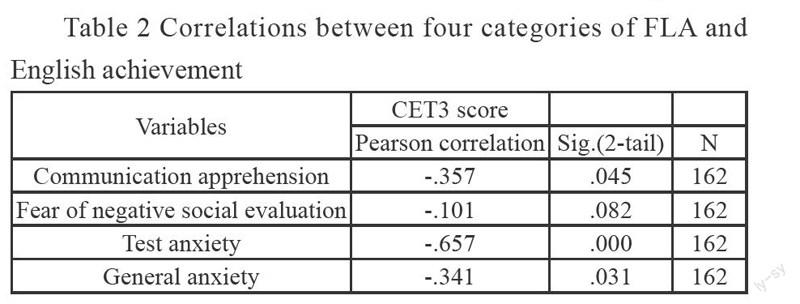A Survey on the correlations between college students’ FLA and English achievement
Bi Ran
【Abstract】FLA (foreign language anxiety) is one of the affective factors that most pervasively obstruct the learning process. The paper is concerned with an empirical study on the correlations between college students FLA and English achievement.
【Key words】A survey on the correlations; FLA; college students
1.foreign language anxiety
Foreign language Anxiety is a specific anxiety. It is the feeling of tension, uneasiness, frustration, self-doubt and apprehension specifically associated with speaking, listening and learning in foreign language learning contexts. Horwitz et al. presents the three major components of foreign language anxiety: communication apprehension, test anxiety, and fear of negative evaluation.
2. Methodology
2.1 Research questions
1)How does foreign language anxiety correlate with subjects English achievement?
2)What implications can be drawn for college English teaching and learning from the study?
2.2 research subjects
There are 349 students who are randomly chosen in Liaoning University of Technology. However, 24 of them did not answer the questions completely. Therefore, the subjects for the study are 325 college students.
3. The correlations between FLA and English achievement
3.1 Data analysis
3.1.1 The correlations between learners overall FLA and their English achievement
3.1.2 Correlations between four categories of FLA and English achievement
In the Table 2, Pearson correlation is performed to detect the relationship between subjects four categories of FLA and their English Achievement. The result presents that there is a strong correlation between test anxiety and achievement, communication apprehension and general anxiety are weakly correlated with English achievement, while Fear of negative social evaluation have no correlation with CET3 score with r= -.101 and Sig=.082.
3.2 Discussion
3.2.1 Discussion on the correlations between learners overall FLA and their English achievement
As to the correlation between language anxiety level and achievement, the correlation coefficient is-.302. The result shows that there is a medium negative correlation between the FLA and the achievement. That is, the higher the learners achievement is, the lower the learners language anxiety is. This result is in consistent with these of many previous studies as proficiency increase, anxiety declines in a fairly consistent manner. Poor foreign language achievement, in turn, reinforces foreign language anxiety. Consequently, these two variables affect each other constantly. A student interviewed said: “Because my English is poor, I feel nervous and worried when doing class activities. As a result, without a relaxed emotion and enough confidence, I cannot perform well and get enough practice, so I get involved in a vicious circle.”

3.2.2 Discussion on correlations between four categories of FLA and English achievement
There are significant negative correlations between test anxiety and achievement according to statistical result(r=-.657 Sig=.000). Namely, the higher the achievement is, the lower the test anxiety will be. In addition, communication apprehension and general anxiety weakly correlated with English performance with the coefficients being -.357 and -.341 respectively, which revealed that both high-score and low-score students have no significant differences in communicative anxiety and general anxiety, which chiefly because high-achieving students and low-achieving ones both have high communicative apprehension. The finding supports Saitos (1999) study who found that subjects with high achievement also have high anxiety. However, far from the previous view, the present study has showed there is no correlation between fear of negative social evaluation and performance. The reason may partly be traced to characteristics of secondary vocational students and high vocational school discussed above. Both top group and bottom group have low fear of negative social evaluation.

